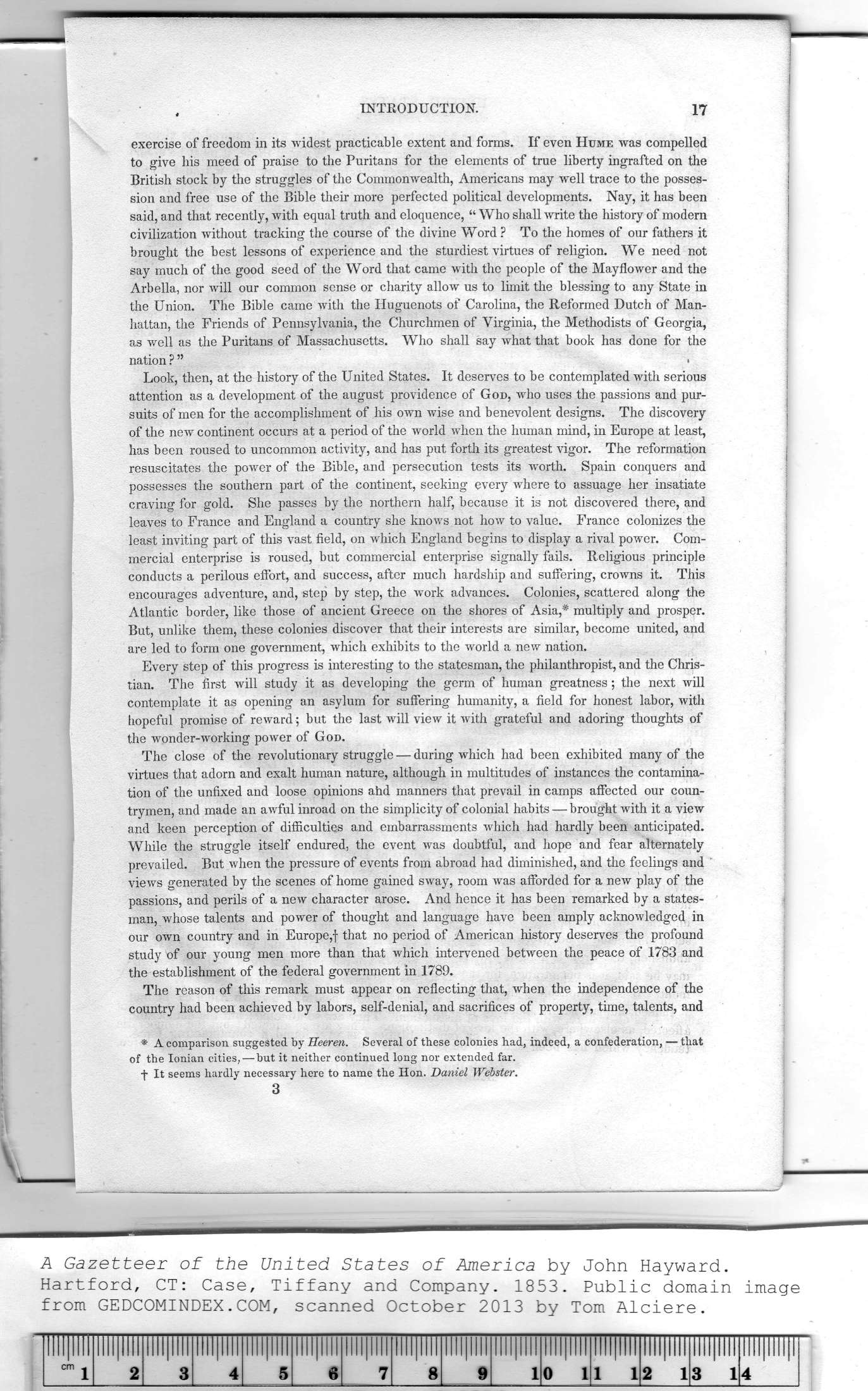|
|
Note: Ctrl and + increases the font size of the text below, Ctrl and - decreases it, and Ctrl and 0 resets it to default size.
INTRODUCTION. 17
exercise of freedom in its widest practicable extent and forms. If even Hume was compelled
to give his meed of praise to the Puritans for the elements of true liberty ingrafted on the
British stock by the struggles of the Commonwealth, Americans may well trace to the posses-
sion and free use of the Bible their more perfected political developments. Nay, it has been
said, and that recently, with equal truth and eloquence, “ Who shall write the history of modern
civilization without tracking the course of the divine Word ? To the homes of our fathers it
brought the best lessons of experience and the sturdiest virtues of religion. We need not
say much of the good seed of the Word that came with the people of the Mayflower and the
Arbella, nor will our common sense or charity allow us to limit the blessing to any State in
the Union. The Bible came with the Huguenots of Carolina, the Reformed Dutch of Man-
hattan, the Friends of Pennsylvania, the Churchmen of Virginia, the Methodists of Georgia,
as well as the Puritans of Massachusetts. Who shall say what that book has done for the
nation ? " ,
Look, then, at the history of the United States. It deserves to be contemplated with serious
attention as a development of the august providence of God, who uses the passions and pur-
suits of men for the accomplishment of his own wise and benevolent designs. The discovery
of the new continent occurs at a period of the world when the human mind, in Europe at least,
has been roused to uncommon activity, and has put forth its greatest vigor. The reformation
resuscitates the power of the Bible, and persecution tests its worth. Spain conquers and
possesses the southern part of the continent, seeking every where to assuage her insatiate
craving for gold. She passes by the northern half, because it is not discovered there, and
leaves to France and England a country she knows not how to value. France colonizes the
least inviting part of this vast field, on which England begins to display a rival power. Com-
mercial enterprise is roused, but commercial enterprise signally fails. Religious principle
conducts a perilous effort, and success, after much hardship and suffering, crowns it. This
encourages adventure, and, step by step, the work advances. Colonies, scattered along the
Atlantic border, like those of ancient Greece on the shores of Asia,1 multiply and prosper.
But, unlike them, these colonies discover that their interests are similar, become united, and
are led to form one government, which exhibits to the world a new nation.
Every step of this progress is interesting to the statesman, the philanthropist, and the Chris-
tian. The first will study it as developing the germ of human greatness; the next will
contemplate it as opening an asylum for suffering humanity, a field for honest labor, with
hopeful promise of reward; but the last will view it with grateful and adoring thoughts of
the wonder-working power of God.
The close of the revolutionary struggle — during which had been exhibited many of the
virtues that adorn and exalt human nature, although in multitudes of instances the contamina-
tion of the unfixed and loose opinions ahd manners that prevail in camps affected our coun-
trymen, and made an awful inroad on the simplicity of colonial habits — brought with it a view
and keen perception of difficulties and embarrassments which had hardly been anticipated.
While the struggle itself endured, the event was doubtful, and hope and fear alternately
prevailed. But when the pressure of events from abroad had diminished, and the feelings and
views generated by the scenes of home gained sway, room was afforded for a new play of the
passions, and perils of a new character arose. And hence it has been remarked by a states-
man, whose talents and power of thought and language have been amply acknowledged in
our own country and in Europe,f that no period of American history deserves the profound
study of our young men more than that which intervened between the peace of 1783 and
the establishment of the federal government in 1789.
The reason of this remark must appear on reflecting that, when the independence of the
country had been achieved by labors, self-denial, and sacrifices of property, time, talents, and
A Gazetteer of the United States of America by John Hayward.
Hartford, CT: Case, Tiffany and Company. 1853. Public domain image
1
A comparison suggested by Ileeren. Several of these colonies had, indeed, a confederation, — that
of the Ionian cities, — but it neither continued long nor extended far.
f It seems hardly necessary here to name the Hon. Daniel Webster.
3
|
